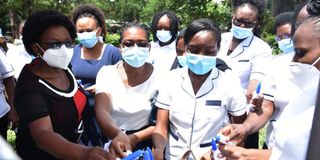Concern as virus kills 25 health workers and 2,200 get infected

Mombasa County nurses light candles on Thursday during the burial of their colleague, Ms Margaret Ngeti, a nurse at Port Reitz Hospital, who succumbed to Covid-19.
What you need to know:
Data from unions show that about 800 doctors and 320 clinical officers and 600 nurses have so far been infected.
Fifteen nurses and six doctors have died while the rest are recorded in other cadres.
As Covid-19 infections rise faster in the country, many healthcare workers are contracting the disease as others pay the ultimate price. At least 2,200 healthcare workers have been infected and another 25 have died since the disease was first detected in the country in March, according to data from their unions.
In the last two days, the country has lost two renowned surgeons, Dr Ashraf Emarah, a plastic surgeon at the Moi Teaching and Referral Hospital, and Dr Vladimir Shchukin, a bariatric, general and laparoscopic surgeon at Nairobi Hospital.
Dr Emarah died early yesterday morning while being rushed to hospital. He had been a lecturer at the university’s Department of Surgery and Anaesthesiology School since 1998.
The medical fraternity described Dr Emarah as a dedicated and passionate doctor who loved humanity. Prof Tenge Kuremu, principal at the College of Health Sciences at Moi University, said his death was a huge blow to the health sector, which is already struggling with the low number of specialists. There are just 10 plastic surgeons left in the country.
“He was working with Amref in a number of countries such as Malawi, Congo, Egypt and Ethiopia. This is a major blow,” he said.
600 surgeries
Jane Ngige, programmes officer at the Smile Train Africa, an organisation that offers free cleft and palate surgeries, said for the past 12 years, he was involved in over 600 surgeries under the programme.
The latest deaths have caused alarm among medics as the country yesterday registered one of the highest infection figures – 1,470 – and 25 new deaths, bringing total cumulative deaths to 1,228. As of yesterday, 1,364 patients were admitted in various hospitals. The total caseload stood at 68,193.
The deaths among medics have been blamed on the inability of public hospitals to deal with the increased number of patients and the demands for pay for admission by the high-end private hospitals.
Most counties in the second wave of the disease have registered a higher number of infections that are stressing their health systems, a sign of the challenges medical staff are facing. Going by the records from the World Health Organization, South Africa is the leading in the number of healthcare workers infected with 32,429 cases, followed by Algeria with 5,000 infections.
Kenya comes in eighth on the list. In the past two weeks, the country has lost three nurses to Covid-19.
Data from unions show that about 800 doctors and 320 clinical officers and 600 nurses have so far been infected.
Fifteen nurses
Fifteen nurses and six doctors have died while the rest are recorded in other cadres.
Others are severely ill and are admitted to Intensive Care Units. However, Saturday Nation could not immediately establish the exact number.
National Nurses Association of Kenya (NNAK) president Alfred Obengo and Kenya National Union of Nurses deputy secretary-general Maurice Opetu said health facilities are overwhelmed, with just a few personnel left to attend to all the patients while using substandard personal protective equipment.
“We will definitely succumb to the virus if we are to continue working in such conditions,” Mr Opetu said.
Healthcare workers in several counties have downed their tools protesting the lack of protective gear. The Ministry of Health has given the Kenya Medical Supplies Authority the greenlight to dish out the PPE that have been lying at its warehouse for eight months now. Mr Opetu told the Saturday Nation that with no risk allowance and life insurance, health workers are demoralised.
“When you are infected, you need to cough up money for treatment; there is no risk allowance for the past five months, yet we are attending to Covid-19 patients. No life insurance yet we are dying and leaving our loved ones with nothing,” Mr Opetu said.
“We have for the last months doubted the quality of the locally produced masks. And even with the quality issues, the supply is erratic,” he added.
Mr Opetu also pointed out that hospitals are not accepting their insurance cards, including from NHIF and other insurers, yet they risk their lives every day.
Heavy workloads
“Last week, we lost a healthcare worker because most hospitals refused to admit him before he made a deposit of Sh100, 000. The worker did not have the money and we had to rush him to a public hospital. We lost him on the way,” he said.
Kenya Medical Practitioners, Pharmacists and Dentists Union (KMPDU) secretary-general Dr Chibanzi Mwachonda said: “A majority of these infections are from contact with infected patients, which further reinforces our concern over provision of adequate and quality personal protective equipment and the shortage of staff.”
Dr Matshidiso Moeti, WHO Regional Director for Africa, said during the WHO Africa presser that inadequate access to personal protective equipment or weak infection prevention and control measures raise the risk of health worker infection.
“Risks may also arise because of heavy workloads which result in fatigue, burnout and possibly not fully applying the standard operating procedures,” Dr Moeti said.
“One infection among health workers is one too many,” said Dr Moeti. “Doctors, nurses and other health professionals are our mothers, brothers and sisters. They are helping to save lives endangered by Covid-19. We must make sure that they have the equipment, skills and information they need to keep themselves, their patients and colleagues safe.”
Additional reporting by Stanley Kimuge and Hellen Shikanda





